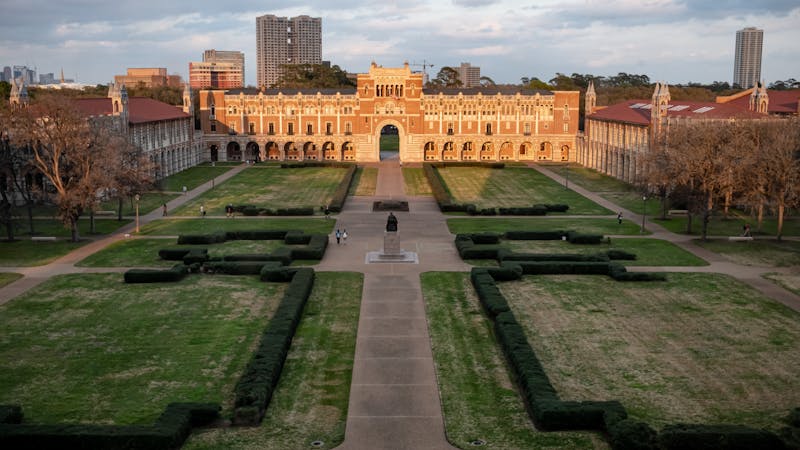Competition causes food waste reduction
Thresher Staff
The Zero Waste Campaign’s first Food Waste Reduction Competition led to a 23.3 percent reduction in waste at Sid Richardson College Kitchen, a 15.8 percent reduction at West Servery and an 11.1 percent reduction at Baker College Kitchen, according to Baker College Eco-Rep Travis Kwee. The numbers from South and North Serveries are still being calculated.
Kwee, a sophomore, described the many environmental effects of food waste and the possibility of resolving the issue.
“Many organizations independently came up with the idea that food waste is a huge issue that extends to many other issues such as water shortages, world hunger and methane emissions” Kwee said. “It spans multiple issues and is easily solvable by pushing people to change their lifestyles to decrease food waste.”
The Student Association Environmental Committee, Eco-Reps, Environmental Issues: Rice into the Future (ENST 302) class and the Rice Environmental Club collaborated to create the Zero Waste Campaign.
SA Environmental Committee Co-Chair and Eco-Rep Kira Bre Clingen said she looks forward to the potential longer term effects the waste campaign could have, including composting initiatives, more sustainable energy sources and separate instead of single-stream recycling.
“We’re definitely seeing more awareness and also more of an interest about actively engaging in conversations about the environment” Bre Clingen, a Duncan College senior, said. “This is about raising awareness and fighting against the culture of apathy towards environmental issues that Rice has.
Wiess College New Student Representative Avery Jordan said the Food Waste Reduction Competition could be repeated annually.
“We’ll be sending out a final survey to all the colleges and students to get feedback on how many people we reached and what we could have done better,” Jordan said.
Emily Foxman, Lovett College Eco-Rep and a student in the ENST 302 class that co-sponsored the campaign, talked about the future of combatting food waste on campus.
“Our long-term plan is based on education initiatives,” Foxman, a sophomore, said. “We want to keep up the posters that we have in some of the serveries. We’re trying to determine if there’s a correlation between the posters that are up and the difference in waste reduction between serveries.”
For the competition, servery staff weighed trash from different colleges six times over the course of two weeks, then weighed five meals during the week of the competition.
The numbers from the two periods were then averaged individually and compared to produce a percentage decrease. The final results will be announced this week and a follow up weighing will occur in December to judge the permanent effects of the campaign.
The campaign also included a clean plate challenge, in which individuals were encouraged to take pictures of themselves and their empty plates.
More from The Rice Thresher

Rice accepts 13% of record-setting ED applications
Rice accepted 13.2% of Early Decision applicants in its first round of admissions for the class of 2029, said Yvonne Romero da Silva, vice president for enrollment. With 2,970 total applicants, this year saw yet another record-high; a 3% increase from last year’s previous high of 2,886. An additional 100 students gained admission through the Questbridge National College Match program, an uptick from last year’s 77.

Students reject divestment proposals
The student body voted to pass S.REF 01, which asks the Rice Management Company to disclose all of its holdings investments, but rejected the remaining divestment proposals. While every ballot measure gained a majority of votes in favor, the remaining three did not achieve the two-thirds majority required to pass.

Student organizations form coalition to support SA referenda
Four Student Association referenda open for the general student body vote today at noon. The referenda call for disclosure of Rice Management Company holdings and divestment from entities that profit off the Israel-Hamas war. The referenda also ask that Rice release a statement condemning genocide and materially support anti-colonial scholarship. Voting will close Dec. 11 at noon and the results will be published the next day. For the referenda to pass, a two-thirds majority with a 20% student body turnout is needed.

Please note All comments are eligible for publication by The Rice Thresher.